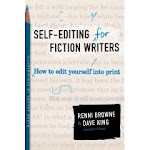Monday, November 29, 2010
Paralyzing Fear
I have a different opinion. I’ve talked with (okay, occasionally ambushed) many writers over the years and find the conversation might go something like this.
Me: “Have you ever had to deal with writer’s block?”
Anonymous Writer: “No, never. Once I start a project I just keep going, no matter what I’m feeling.”
Me: “What about before you begin a project? Have you ever postponed it because of doubt in your ability to do it justice?”
At this point the person I’m speaking with usually takes a step back and begins to hem and haw. Most writers don’t include being afraid to start a project writer’s block. I would beg to differ – anything that keeps you paralyzed and unable to write is, by definition, writer’s block.
Funny thing is that the people who suffer most from writer’s block are writers who’ve had a modicum of success. Maybe they’ve won a contest or two, or written regularly. Far more often I find that they’re afraid they can’t live up to what’s gone before. I also find it when a writer is trying a new genre. They might be going from fiction to non-fiction, or from writing devotions to writing a column. Let’s face it, trying something new is always a daunting prospect.
Now that we’ve defined it, how do we combat it?
First, quit putting it off. Make a commitment to spend a certain amount of time in front of the computer – writing – and do it. Sound hard? Of course it is, otherwise everyone would be a writer!
Begin by writing what you’re afraid of. Fear of failure? Write why it matters. Fear of inadequacy? Define it. You’ll find that it looks small and actually a little silly when you actually write it down.
Next, remember how you got here. Recognition in the writing world comes (99.9% of the time) from putting in time. It comes from being willing to let others see your work and getting back at it after rejection. Give yourself some credit – you’re obviously not a sissy, or you wouldn’t be trying to become a writer.
Finally, give yourself permission to try and fail. Just because this one project doesn’t work out doesn’t mean you’re not a writer. I would say the contrary is true. If everything you’ve tried, succeeded, maybe you’re not trying much.
So get out there, quit procrastinating under the guise of ‘I have to think this through before I start.’ Blow a raspberry a writer’s block and hit those keys!
Sunday, November 21, 2010
Thanksgiving
- Which writing tool are you most thankful for?
Having begun my writing career on an electric typewriter, I am most thankful for my computer! And as an author of historical fiction, I'd be lost without http://etymonline.com/.
- Which writing friend(s) are you thankful for?
God blessed me this year with new critique partners: Susan, Cindy, Carla. And God did something special when He crossed my paths with Christian reading enthusiast Beverly, who has become a stalwart supporter. And there are soooo many others!
- Which book have you read this year that you are most thankful for?
My favorite nonfiction was 90 Minutes in Heaven, especially when my own dear mother went home to be with the Lord less than a month after I read it. No, I won't repeat my annual books in review. For fiction, I'll just mention Stealing Home by Allison Pittman, the Carol award winner, as one of my favorites.
- What has happened in your writing journey that you are thankful for?
God has built my tribe and given me contracts ... and I've matured as a professional over the last twelve months. Thank you, God!
I could say a lot more - but I'd love to hear from all of you!
Sunday, November 14, 2010
Do I Really Need a Writers Group or a Critique Partner?
- Between you and other writers
- Between you and the reader
- Between the reader and the subject or characters
- Between you and the editor
- Between you and your agent
We need others in our profession to give us feedback, keep us grounded and provide encouragement. You may be tempted, like I was at first, to insert friends and family into this role. Unless they’re also writers this dynamic just doesn’t work. They’ll unwittingly encourage you when you need a swift kick in the pants and administer the kick in the pants when you need encouragement.
That’s where a writers group, critique group or critique partner will help. But you have to be careful—some critique and writers groups can be toxic. I’ve visited some where the purpose appears to be to build up the one delivering the critique by tearing down the hapless author. You want to avoid these groups at all cost.
Here’s a list of what to look for in a group or a partner
- An encouraging atmosphere –not all sweetness and light—nobody improves on false compliments. But I’ve almost never found a manuscript that didn’t have some redeeming quality.
- A mutually beneficial relationship. You should both bring something valuable if it’s a partnership—you may excel at writing dialogue and your partner is a whiz at description.
- A hunger to improve. If it’s a group there should be a movement toward growth in the majority of members. Even if you’re all beginners, if you’re all reading writing books and attending classes you’ll be able to grow and learn together.
- A timekeeper. If someone’s not willing to keep track of the time not everyone will get a chance to be critiqued. It’s a dirty job, but someone’s got to do it!
Tuesday, November 9, 2010
An Important Announcement
This is Daniel DeGarmo with DeWard Publishing Company.
I'm sure all of you are aware of Sandi Rog's latest battle (with cancer - Type T-cell Lymphoma) that just began last week. As you can imagine, she's devastated, especially considering the timing of all this as her first novel, The Master's Wall just released last Monday.
Well, considering we are a small publishing company and can pretty much do whatever we want, my business partner and I have agreed to donate an additional $1 per book to a Fund that I'll be setting up this week.
Just so no one thinks we are being shady about the whole deal, this is above and beyond the royalties that Sandi (and her agent) is already incurring with every book sold. The purpose of this fund is to help out Sandi's family (husband and children) while she is laid up fighting for her life.
What I need from you is simply spread the word. For every copy of "The Master's Wall" that is sold (including Kindle) we will donate $1 to this Fund. I'll also be setting it up so that it can receive regular donations if anyone is interested in just helping out financially.
I hope to have more information to share in the next day or so but at least for now I would ask that you would do whatever you can do direct people to buy Sandi's book.
Sandi has been copied on this email.....Sandi..Please forward this message on to anyone you think would help us out in getting the word out.
The same goes for you if you've received this email.
I want to close by lifting the following prayer up on Sandi's behalf:
Father, I lift my sister before you as her body has been stricken with disease.
You know, O God, that she has used her gifts to glorify You and spread your wonderful message of grace and love.
It is my humble plea that you would bring her healing and complete recovery. I know You can do this, You are the Great Physician.
Please bring Your Spirit into her home as her husband and children continue to live life without her there. They need You.
May all that is done bring You glory as our God and Father.
In Jesus' name - AMEN!
If you have any questions, don't hesitate to ask.
Dan
THE MASTER'S WALL
Sunday, November 7, 2010
R.U.E. (Resist the Urge to Explain): How Much Is Too Much?
Quick Interruption!
Before we turn this post over to Darlene, I wanted to let everyone know that Sandi has temporarily turned the reins over for The Book Doctor. Sandi is currently in the hospital undergoing treatment unrelated to MS. Please join us in praying for her and for her family. We know she'll be back with us soon and we'll keep things going here until she returns. We'll be posting periodic updates, so keep checking back.
Blessings,
The Crew at Book Doctor
R.U.E. (resist the Urge to Explain)
The writer creates between two opposites: the reader wants to know and R.U.E. (resist the urge to explain, or more colorfully put, the reader's not stupid!)
Example of "the reader wants to know" (taken from the copyedit of my next published book, Love's Raid, coming out next March from Heartsong Presents):
The grocer’s wagon flew past Clara Farley, the wheels spewing dirt and rocks, coating the skirt of the dress she had chosen for this special occasion.
The copy editor said, "I couldn’t immediately figure out if she was walking, on horseback, or driving." Okay. I need to put in a word or two indicating she's on foot.
Example of R.U.E., from my current WIP, Knight Music, scheduled for release next October. It comes at the end of the first chapter:
Why did he feel like his success would depend on Sonia? Of all people, Sonia was the one person he couldn't count on.
What's the R.U.E. section? The second sentence. The first sentence says it all. Out it goes . . .
How to we know when to add and when to delete?
Adding usually is needed when we need to clarify something. If the heroine arrives somewhere by horse, I need to show her taking care of the horse before she goes inside.
Deleting is harder to detect. Some examples:
- Overemphasis? Am I overemphasizing something that makes no difference in the story, the equivalent of the gun in the room? In my current WIP, the heroine (Sonia, of course), is sketching in a prayer journal. I use it as a means to show her thoughts about the hero. When I say people like to peek into her journal, am I implying later in the story someone will peek into the journal--and see something they shouldn't? Either I delete the comment--or I add a bit more about the journal later in the story.
- Planting hints? When is enough enough? The hero in my WIP (we eventually discover) has a dark secret in his past. My hints must walk a fine line between making it believable when the reader discovers the truth; or hitting the reader over the head with it. Examples:
--Maybe that was what happened when her best work was stolen and she lost her sense of direction. He ought to know. Hadn’t he come to Ulysses for much the same reason? His mouth twisted at the irony of it.
--Four pages later: He could tell the truth, up to a point.
--One page later: “And I apologize for soaking your shirt. So we’re even. Sort of.”
If only she knew the truth.
--A page after that: He knew exactly what he intended to do to get back into his family’s good graces, but he wasn’t about to tell anyone.
--Four pages later: Ty wandered downe the aisle ahead of her, and with the arch of an eyebrow, grabbed a box of cereal with a cartoon vampire on the front. “I’m like this cereal. I’m irresistible, but ultimately, I’m bad for you.
Looking at it this way, I suspect I'm overdoing it a little. Hmm. Good exercise.
In your own work, look for both problems:
Is something unclear that needs additional explanation?
Is something overstated and needs to be shortened?
Feel free to share examples from your writing and let us help!











